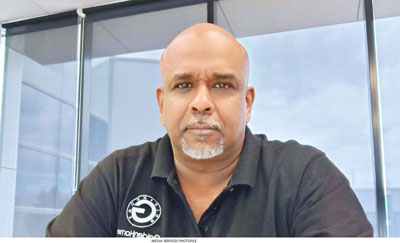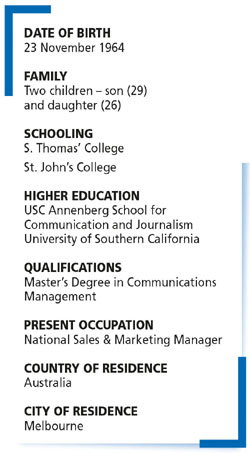SRI LANKANS OVERSEAS

THE FEUDAL MINDSET
Why tribal inclinations must be set aside – Vasee Nesiah

Q: As far as perceptions go, do you think Sri Lanka is capable of regaining its composure in the aftermath of the pandemic?
A: Yes, Sri Lanka can regain its composure if the fight against COVID-19 is driven by science and not politics.
COVID-19 is unforgiving and we have learned tough lessons in Australia especially in Melbourne.
In Australia, the state and federal governments formed a National Cabinet (comprising leaders from both major parties) to formulate state and federal level responses to the pandemic.
Medical doctors and epidemiologists were charged with formulating a response and politicians had the tough job of selling the lockdown policy to the public.
 Q: How do you perceive Sri Lanka today?
Q: How do you perceive Sri Lanka today?
A: As always, Sri Lanka is paradoxical. The country has so much potential for good but seems to defeat itself constantly.
Whilst Sri Lanka has advanced on so many fronts, the national psyche seems plagued by a feudal mindset, and the ethnic, social and religious insecurities that lead to conflict and division. If we set aside our tribal inclinations, I have no doubt that we’ll realise that we’re all remarkably alike.
The shocking reaction to America’s new Vice President-elect Kamala Harris is both telling and sad. Her Indian-Tamil roots have no bearing on Sri Lanka’s ethnic fissures; and her advancement has no comparison to Sri Lanka’s claim to the liberation of women.
It was only last year that the President of Sri Lanka validated an archaic law that forbids women from buying alcohol. Sri Lanka can celebrate the liberation of women in society when the daughter of an immigrant (e.g. an Indian-Tamil estate worker) can be considered for the role of president or prime minister.
Whilst women have had the right to vote and education for a long time, their success in politics is almost always because they are someone’s wife or daughter.
Q: And how do Australians view Sri Lanka, in your assessment?
A: I think the universal sentiment is positive due to Sri Lanka’s success in cricket and how well its expats have assimilated into Australian society – in contrast to some others.
Q: Likewise, how do other Sri Lankans living in Australia view their country of birth?
A: There are a few who use a political lens but for the most part, we love the country of our birth and we’re proud to be Australians of Sri Lankan descent.
Q: What were your impressions of Sri Lanka on your last visit and how much has it changed from the past?
A: I was in Colombo in March last year, and witnessed a gentrification of Colombo and its suburbs but not of the inhabitants of those areas.
Sadly, very few people seem to take pride in their city… you see them tossing garbage out of cars and three-wheelers, dropping rubbish on the pavement and so on. There are sporadic efforts to clean up a beach or two but the pollution that washes ashore must sap the will of those who care.
Q: How do you perceive news about Sri Lanka and what mediums do you rely on to stay connected especially during times of crisis?
A: Social media delivers the news long before traditional media. You have to learn to use a filter to absorb the news that comes to you through social media.

Q: How do you view the brain drain and why is there still no reversal of it, in your opinion?
A: Sri Lanka has been plagued by brain drain since the 1960s. The nation must offer a stable and apolitical environment if it wants to reverse the brain drain.
The experience, ideas and learnings of returning Sri Lankans are far more valuable than the financial investments that the Board of Investment (BOI) wants to solicit. Money that comes into the country is often repatriated as dividends and profits. Ideas, attitudes and knowledge will go viral – and clichés aside, success begets success.
Q: What should Sri Lanka focus on in the coming decade?
A: Sri Lanka must focus on developing a stable apolitical meritocracy.
If its leaders want a legacy that sets them apart from their predecessors, they must look beyond their personal political fortunes; and I’m confident that they will be rewarded richly for their vision and self-discipline.
Q: And what are your hopes for the country in the next decade or so?
A: A strong middle class, and an environment where gender, ethnicity, caste and religion are not barriers or stepping stones to success.





Leave a comment